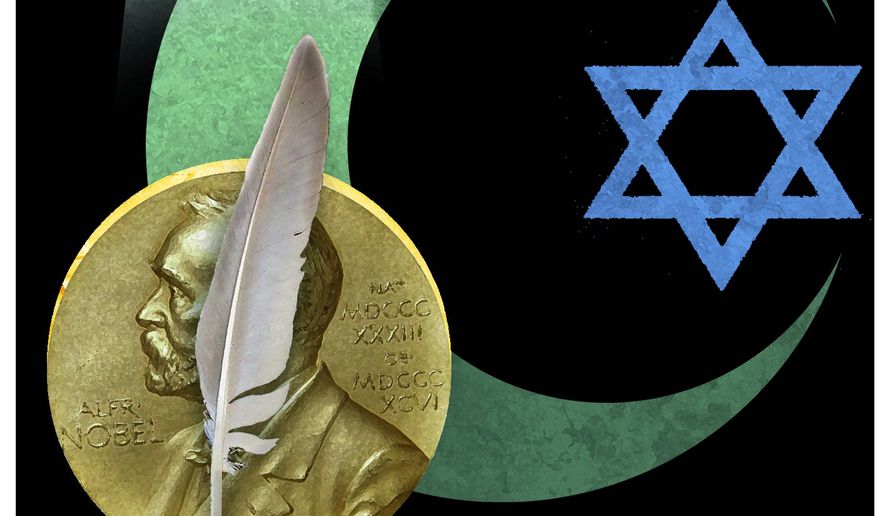OPINION:
At the beginning of October, the Norwegian Nobel Committee awarded the Nobel Peace Prize for 2021 to two journalists — Maria Ressa and Dmitry Muratov — for “their efforts to safeguard freedom of expression, which is a precondition for democracy and lasting peace.” The committee noted that “they are representatives of all journalists … in a world in which democracy and freedom of the press face increasingly adverse conditions.”
Fair enough.
It is also fair to point out that it’s possible that part of the reason why the committee gave the award to a couple of reporters was to avoid giving it to President Trump and former Secretary of State Mike Pompeo for the Abraham Accords.
The Abraham Accords, signed in September 2020, is the most material agreement to have emerged from the Middle East since 1948. It ratified the validity of Israel, severed the Palestinian question from the larger and more urgent matter of Arab-Israeli relations, and laid the foundation for greater commercial and social cohesion within the region.
It was also a rebuke to the American foreign policy establishment’s bipartisan cluelessness with respect to the Middle East. For 60 years, that establishment has pretended that the right answer was to force the Israelis and the Palestinians into ever more meaningless “talks” while ignoring the fact that the Arab world had and has interests that go well beyond the question of Israel.
Mr. Trump and Mr. Pompeo wisely ignored all that and assumed ab initio that Israel was a sovereign nation with rights, including determining the location of its capital and defending its borders. They also recognized that the real threats to the Arab world originate, now as then, primarily from the Turks and the Persians.
The Arabs also understand that the real challenge in the Middle East is not Israel but rather the immediate threat posed by Iran, the scavenger states of China and Russia, and the slightly longer-dated threat posed by Turkey. In those contexts, Israel is an ally, largely because of its ties to the United States and also because Israel has an enduring interest in ensuring that the Middle East remains peaceful.
When confronted with the civic and institutional deterioration of the last four decades in Syria, Iraq, Lebanon and Libya, and the challenges posed by Iran and Turkey, it was natural for the Arabs to turn toward collective defense and include in that collective sentiment their neighbor Israel.
Mr. Pompeo, especially, knew that Iran – not Israel or the House of Saud — is the immediate problem child in the Middle East. The difference is that he and the president acted decisively on that knowledge, imposing steady downward pressure on the regime and, ultimately, killing the mastermind of its expansionist agenda.
Finally, the surge in American oil and natural gas production, which will continue once the current administration exits, has made economic diversity an imperative in the region. Saudi Arabia and its friends sense, more than most, the urgency of economic diversification and growth. Consequently, Mr. Trump and Mr. Pompeo folded in a generous measure of economic considerations, previously lacking in the deliberations.
For recognizing and executing all of that, Mr. Trump and Mr. Pompeo deserve credit and recognition.
Let’s compare their body of work to others who have been awarded the Nobel Peace Prize.
Woodrow Wilson won for establishing the League of Nations, which failed because he could not convince his own countrymen that it was a good idea. Frank Kellogg won for the Kellogg-Briand Pact of 1928, which renounced war to solve international disputes. That pact lasted just slightly more than a decade.
Linus Pauling, who managed to be both a fellow traveler of the Russian communists and a pen pal of Ho Chi Minh, won the peace prize for effort on nuclear disarmament, which has failed.
Henry Kissinger won for bombing Cambodia and otherwise executing an undeclared war in Southeast Asia. Yasser Arafat won for reasons known only to the Nobel committee. Maybe he killed only hundreds of Jews when he could have killed thousands.
Jimmy Carter won for being a pretty fair ex-president. Al Gore won for having one of the largest carbon footprints on the planet while constantly yammering about climate change, despite making his money from oil. Barack Obama won for being the first African-American president.
When you look at that list of non-accomplishments and compare them to the Abraham Accords, it is evident that the Nobel committee was probably influenced by something other than an objective look at the facts. They don’t like and disapprove of Mr. Trump and his administration, so they are willing to ignore its achievements.
Think about that the next time you are tempted to think of the Nobel Prize as something meaningful.
• Michael McKenna, a columnist for The Washington Times, is the president of MWR Strategies. He was most recently a deputy assistant to President Trump and deputy director of the Office of Legislative Affairs at the White House.




Please read our comment policy before commenting.